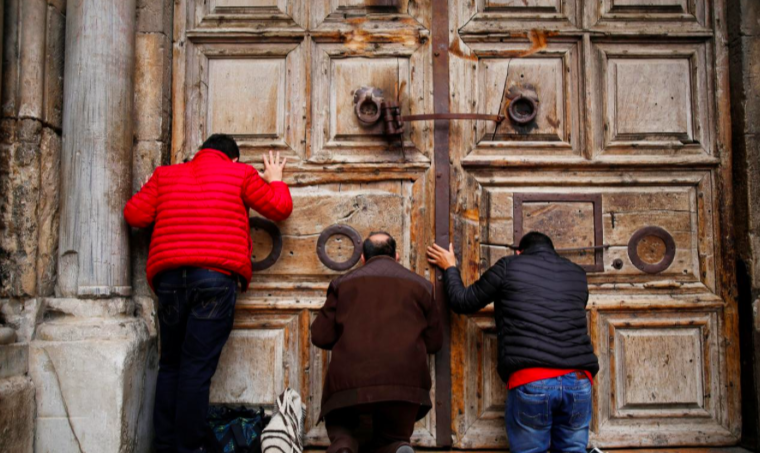How Israel's Christians are fighting moves to take their land away
Christians in Jerusalem are warning of another attempt by Israeli parliamentarians to take land they own.
Just days before Christmas, Israeli President Reuven Rivlin stepped in to prevent an attempt by one of the coalition partners in the Netanyahu government to allow the state to 'confiscate' or nationalise church-owned lands. This was the fifth occasion on which factions within the governing coalition sought to impose legislation which would allow expropriation of Church lands.

Previous attempts to impose the so-called 'Tenants' Rights Bill' received worldwide condemnation and even led to the temporary closure of the Church of the Holy Sepulchre in the Old City – the historic site of Jesus' crucifixion and resurrection.
In an annual Christmas meeting with Church leaders, President Rivlin insisted: 'The State of Israel has no intention of harming the property rights of the Churches or their ability to realise their assets to support their activities.' However, there is still concern that upcoming elections in Israel could force concessions to more hardline elements which could mean yet another appearance of the legislation, which has led to local Christians describing it as a 'zombie bill'.
The Patriarch of Jerusalem, the most senior Orthodox Christian leader in the region, has been highly critical of attempts to confiscate land from his and other churches. Theophilos III said: 'While thankful for this reprieve, we are deeply concerned that attempts to bring this legislation forward will continue. We shall therefore remain actively attentive to this matter, and convinced that this Bill has no place in the corpus of legislation of the State of Israel.'
The legislation has been repeatedly criticised around the world with politicians in London and Washington expressing unease. When the Patriarch visited the UK last year, Prime Minister Theresa May was asked about the wider prospects for Christians in the Holy Land. She told the House of Commons: 'We certainly encourage the Israeli government to do all they can to uphold the values of equality for all enshrined in their laws... I will continue to work with governments, with the international community and with the United Nations to support the rights of minorities, including Christians.'
President Rivlin, whose constitutional role is mainly ceremonial, welcomed Christian leaders to an annual Christmas celebration yesterday and reflected on his intervention which ensured the latest version of the bill did not get any further. He told the assembled clergy at his official residence: 'You – like me – believe that living together in this city is the most moral thing to do. Unfortunately, not everyone shares this understanding. Like you, I see the role of the State of Israel as guardians of this city. As guardians, our sovereignty over Jerusalem will never compromise the freedom of worship and religion of all peoples of faith in Jerusalem and in all of Israel.'
Speaking at the same reception, an annual event, the Patriarch said: 'We reiterate our readiness for dialogue to find lasting solutions that benefit our whole society. Yet at the same time we stand united in our position both to defend our legitimate and sacred rights, as well as to continue that constructive engagement with governmental authorities that has been formed and shaped over the many years.'
The Archbishop of Canterbury is among church leaders from around the world who have expressed concern about the recurrence of proposed bills which would threaten church property in the Holy Land. In an interview with ITV Justin Welby called on Prime Minister Netanyahu to continue to uphold religious freedom and the rule of law: 'The proposed law would have a very serious effect on the Christian churches in Jerusalem, the very place we are looking to at this time of year,' he said. 'I admire Prime Minister Netanyahu reflecting Israel's reputation for freedom of religion and belief and the rule of law. I hope he will continue to do so.'











